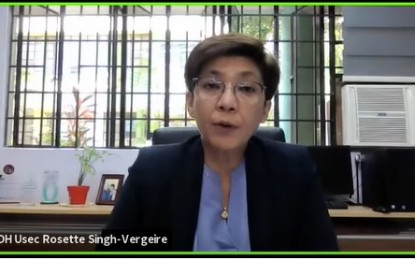
Health Undersecretary Maria Rosario Vergeire (File photo)
MANILA – Fear of adverse events, negative information on vaccines, and different efficacy rates are the top three factors that affect some Filipinos’ decision on whether to get vaccinated against the coronavirus disease 2019 (Covid-19), a health official said Monday.
In an online media forum, Health Undersecretary Maria Rosario Vergeire said the Department of Health conducted an online study with more the 43,000 respondents to know why Filipinos are hesitant about Covid-19 vaccination.
“All [respondents] are from A1 to C, meaning it’s the expanse of our population,” she added.
Vergeire said respondents are concerned about the negative effects of Covid-19 vaccines in the body.
“Second, it’s because of disinformation, negative information they hear, circulating especially from the social media platforms. And the third, hindi nila iniisip na epektibo ang mga bakunang ito (they don’t think these vaccines are effective),” she said.
After evaluating the different aspects of the survey, the DOH conducted virtual town hall meetings to strengthen its information dissemination on Covid-19 vaccination.
“We conduct focused townhall meetings where we identify the groups who can help us solve this vaccine hesitancy and the groups close to the sectors which we must prioritize in the vaccination,” Vergeire said.
So far, the DOH has conducted 75 town hall meetings that are facilitated by experts who explained the efficacy and safety of Covid-19 vaccines the national government uses in its vaccination activities.
“The adverse events are mostly non-serious, meaning these are the common effects of vaccine, which are really natural or normally happen. These non-serious adverse events, now, out of all of those vaccinated, it’s just 1.10 percent of these 5.1 million Filipinos already vaccinated,” Vergeire said.
Meanwhile, the reported serious adverse events are .01 percent of the vaccinated population.
The experts also said there are no proven studies yet that state that serious adverse events or deaths after vaccination were caused by the vaccine.
“We’re going to the ground, to touch base with the sectors we need to speak with and convince them,” Vergeire said. “Sinasabi rin ng mga eksperto na we can’t communicate our way out para tumaas ang pagbabakuna, meron ding dapat tingnan sa parte ng supply side, sa parte ng gobyerno (Experts also say that we can’t communicate our way out for the vaccination rate to go up, there’s also a part in the supply side which must be looked into, the government side), the access part.”
As of May 30, the National Task Force Against Covid-19 reported that the total doses of Covid-19 vaccine administered have reached 5,180,721.
The daily average administered doses in the last seven days is 144,402 all throughout 1,124 active vaccination sites.
About 3,974,350 Filipinos have received their first dose while 1,206,371 have been fully vaccinated. (PNA)
